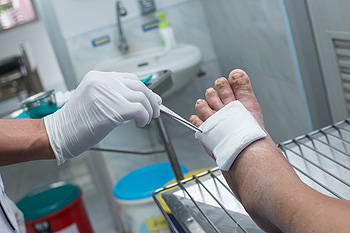 If you have diabetes, research has shown that minor cuts and scratches may take longer to heal than for non-diabetics. These types of seemingly insignificant wounds can result in serious infections if not treated promptly. One of the ways to alleviate this is to inspect the feet daily for any noticeable cuts, blisters or swelling. For patients who have diabetic neuropathy there may be a loss of feeling in the feet, and unnoticed wounds may possibly result in foot ulcers, which may ultimately lead to amputation. It’s suggested to consult with a podiatrist who can perform a process referred to as debridement, which is how dead tissue can be removed. Many podiatrists may recommend staying off the feet whenever possible in addition to wearing a boot that may help to take pressure off any wounds while walking or standing. Daily changing of any bandages on the wounds may aid in proper healing. Ingesting a healthy diet and keeping sugar levels within your target range may promote accelerated healing for foot wounds.
If you have diabetes, research has shown that minor cuts and scratches may take longer to heal than for non-diabetics. These types of seemingly insignificant wounds can result in serious infections if not treated promptly. One of the ways to alleviate this is to inspect the feet daily for any noticeable cuts, blisters or swelling. For patients who have diabetic neuropathy there may be a loss of feeling in the feet, and unnoticed wounds may possibly result in foot ulcers, which may ultimately lead to amputation. It’s suggested to consult with a podiatrist who can perform a process referred to as debridement, which is how dead tissue can be removed. Many podiatrists may recommend staying off the feet whenever possible in addition to wearing a boot that may help to take pressure off any wounds while walking or standing. Daily changing of any bandages on the wounds may aid in proper healing. Ingesting a healthy diet and keeping sugar levels within your target range may promote accelerated healing for foot wounds.
Wound care is an important part in dealing with diabetes. If you have diabetes and a foot wound or would like more information about wound care for diabetics, consult with Raul Hidalgo DPM from South Texas Foot & Ankle Care. Our doctor will assess your condition and provide you with quality foot and ankle treatment.
What Is Wound Care?
Wound care is the practice of taking proper care of a wound. This can range from the smallest to the largest of wounds. While everyone can benefit from proper wound care, it is much more important for diabetics. Diabetics often suffer from poor blood circulation which causes wounds to heal much slower than they would in a non-diabetic.
What Is the Importance of Wound Care?
While it may not seem apparent with small ulcers on the foot, for diabetics, any size ulcer can become infected. Diabetics often also suffer from neuropathy, or nerve loss. This means they might not even feel when they have an ulcer on their foot. If the wound becomes severely infected, amputation may be necessary. Therefore, it is of the upmost importance to properly care for any and all foot wounds.
How to Care for Wounds
The best way to care for foot wounds is to prevent them. For diabetics, this means daily inspections of the feet for any signs of abnormalities or ulcers. It is also recommended to see a podiatrist several times a year for a foot inspection. If you do have an ulcer, run the wound under water to clear dirt from the wound; then apply antibiotic ointment to the wound and cover with a bandage. Bandages should be changed daily and keeping pressure off the wound is smart. It is advised to see a podiatrist, who can keep an eye on it.
If you have any questions, please feel free to contact our office located in San Antonio, TX . We offer the newest diagnostic and treatment technologies for all your foot care needs.
